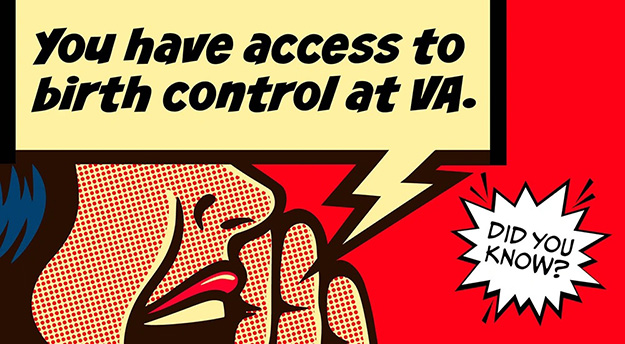Birth control is available at VA and we're here to talk about it. Whether or not you're ready to start a family, have other plans in mind, or you're just busy raising your little ones right now, we're here for you. You have access to contraception care services and a wide range of birth control options at VA.
Our goal is to partner with you in your health care so you feel prepared and can plan for the future you want. While there is no one "best" method of birth control, there is a best choice for you. VA has what you need.
Birth control options available at VA
All types of birth control available in your community are also offered by VA. You have access to the following options at VA:
- Long-Acting Reversible Contraceptives (LARCs). LARCs provide effective contraception for an extended period without requiring you to do anything once inserted. This contraception is get-it-and-forget-it, with a no-hassle type method that includes contraceptive implants and intrauterine devices (IUDs).
- Hormonal methods. Hormonal methods of birth control contain estrogen or progestin. These include injections but also options you have more daily control over, like pills, patches or vaginal rings.
- Barrier methods. Barrier methods block sperm from reaching the egg. These include condoms, sponges, cervical caps and spermicides. These methods tend to be less effective than LARCs and hormonal methods of contraception.
- Sterilization. Sterilization is a permanent method of birth control that involves a safe, surgical procedure and is available for both men and women. This type of method includes tubal ligation, bilateral salpingectomy (removal of both fallopian tubes) or a vasectomy. Sterilization is generally not reversible.
- Same-day emergency contraception. Emergency contraception refers to birth control that can be used to prevent pregnancy shortly after sex and may include a copper IUD or pills.
With all the options available, we understand that choosing can be daunting and confusing. We're here to help you navigate these options so you can make an informed decision about the right method for you.
Determining the best method for you
VA primary care providers are equipped to talk with you about the different birth control options available while also considering your health conditions, lifestyle preferences and future family goals. Things to think about when choosing a birth control method include:
- Convenience
- How effective the method is at preventing pregnancy
- How often the method is taken or used
- Possible side effects
- Non-contraceptive benefits (help with painful periods, acne, etc.)
- Expected menstrual changes
- Privacy
- Your medical health conditions and medications
It's important to discuss your medical history with your provider as certain conditions or medications may make some birth control methods better options than others.
Accessing birth control at VA
If you're enrolled in VA health care, you're eligible to receive contraception care and prescriptions. Plus, there is the convenience of mailing prescriptions to your home or getting them on site. The first step to getting birth control is to schedule an appointment with your VA primary care provider.
We get it, birth control is not a one-size-fits-all situation. We're ready to help you with this personal decision so you can choose the best option for you. Know that conversations with your VA primary care provider are always kept private and held in a sensitive, respectful environment.
Learn about what you have access to on the VA Women's Health website or talk to your VA primary care provider about which option may be best for you. You can also call or text the Women Veterans Call Center at 1-855-VA-WOMEN for more information.
More CDC details on contraception here.





Read Comments